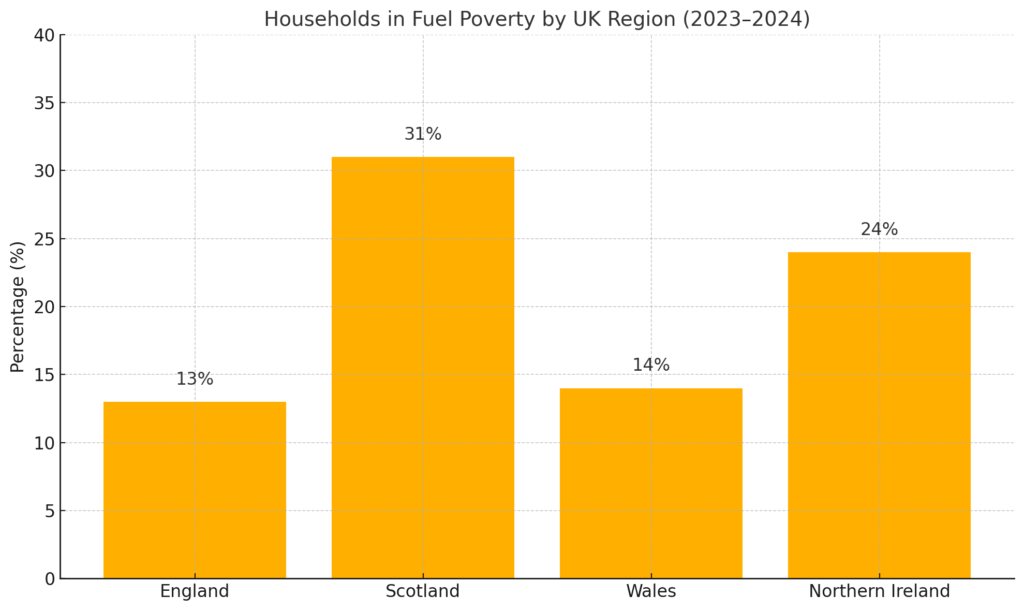Fuel poverty is a term that describes a condition in which a household does not have sufficient financial resources to heat their home to a healthy and comfortable temperature. This is not merely a temporary discomfort – it is a chronic condition that has serious consequences for people’s physical and mental health, social inclusion, and quality of life. In the United Kingdom, this issue affects millions of households every winter, especially among the most vulnerable groups in society – elderly people, children, single parents, and individuals with chronic illnesses or disabilities.
Fuel poverty can mean having to choose between heating and food, between warmth and medicine. Many families spend the colder months in under-heated rooms, often without hot water, dressing in layers and avoiding the use of electrical appliances in order to save money. This is not just an economic problem – it is a social, health and moral issue.
Origin and meaning of the term fuel poverty
The term fuel poverty originated in the United Kingdom in the 1970s, during a time of rising energy prices and growing inflation. Initially seen primarily as an economic issue, the concept gained wider usage during the 1990s, when in-depth studies began examining the impact of cold homes on people’s health and well-being. The problem started to be seen as a form of social injustice, as it disproportionately affects the poorest and most marginalised groups.
Today, a specific methodology is used in England to determine whether a household is experiencing fuel poverty. According to the official definition, a household is considered fuel poor if:
- It lives in a home with low energy efficiency, for example, without proper insulation, with outdated heating systems, or with draughty windows;
- It has low income, which does not allow for covering basic needs such as heating, electricity and gas;
- Its energy costs are disproportionately high compared to income, resulting in a significant reduction of disposable income for food, medicine and other essentials.
This triple combination – inefficient housing, low income and high energy costs – creates a trap from which many people cannot escape without external support.
Data and scale of the problem
The latest data on fuel poverty in the United Kingdom clearly underline the depth and extent of the crisis. Despite government efforts and the work of various organisations, millions of households still live in cold, poorly heated homes, which threatens the health and well-being of the most vulnerable groups in society.

The percentage of households in fuel poverty across the regions of the United Kingdom for the period 2023–2024
This data clearly highlights the severity of the problem in Scotland and Northern Ireland, as well as the disparities between different regions.
England
In 2023, around 13% of households in England, or approximately 3.17 million families, were classified as being in fuel poverty. This means that one in eight households was forced to choose between heating and other essential needs – such as food, medicine or childcare. The most affected were people living in energy-inefficient homes, as well as those with low incomes or limited access to employment.
Scotland
The situation in Scotland is even more concerning. According to recent data, over 31% of Scottish households struggle with high energy costs, placing them in a state of fuel poverty. That is nearly one in three households. The causes are complex – lower average winter temperatures, more dispersed and remote settlements, and a large number of old buildings with poor insulation. In rural areas, the problem is even more acute, as there is often no access to central heating systems, and options for replacing outdated heating appliances are limited.
Wales
In Wales, where the economy heavily relies on low-wage industries and social benefits, around 14% of households are also living in fuel poverty. While this percentage is lower compared to Scotland, the problem remains serious – particularly in the western and northern parts of the country, where climatic conditions and poor building insulation make life more difficult for many families.
Northern Ireland
In Northern Ireland, approximately 24% of households are affected – nearly one in four. This is partly due to the heavy reliance on oil heating, which is both more expensive and less price stable. Many households are not connected to the gas network, meaning they lack alternatives and face high seasonal energy costs.
One Common Problem with Many Faces
According to the National Energy Action (NEA), in 2024 approximately 6.5 million households in the United Kingdom were forced to spend more than 10% of their income solely on energy bills. This is the official threshold above which a household is considered to be in fuel poverty. In reality, however, this percentage is often even higher, especially during the winter months.
What is particularly concerning is that many of the affected families live in social housing or rented properties, where they are unable to make the necessary improvements to insulation or replace old heating systems. The lack of flexibility and limited options creates a vicious cycle of poverty and cold.
Children growing up in cold homes are at greater risk of respiratory illnesses, difficulties with learning, and social isolation. Elderly people, who spend much of their day at home, are also especially vulnerable. Numerous studies show that cold homes increase the risk of heart attacks, strokes and depression.
Behind the Numbers – Human Stories
Every statistic hides real people – an elderly woman who only uses one room in her house to save on heating; a single father who cannot afford a warm shower for his children; a student studying by candlelight to avoid increasing the electricity bill. These are not isolated cases, but everyday reality for millions.
This data clearly shows that fuel poverty is not just a temporary discomfort – it is a serious and systemic form of social inequality that requires urgent and coordinated action. That’s why initiatives like Help One are essential. They not only provide direct assistance but also raise awareness, educate, and advocate for long-term solutions.

Why Donate?
Helping people affected by fuel poverty is not just an act of kindness – it is an investment in human dignity and health. The absence of heating and hot water leads to a range of health problems – from respiratory illnesses to deteriorating mental wellbeing. Moreover, the situation deepens social isolation and increases the risk of falling deeper into poverty.
Organisations like Help One work to provide:
- Emergency assistance with paying gas and electricity bills;
- Replacement or repair of inefficient heating systems;
- Advice on energy efficiency;
- Local support through communities and volunteers.
Donations for tackling fuel poverty save lives. They provide:
- Warmth to the home of an elderly woman who cannot afford to heat it;
- Peace of mind for a single mother facing the harsh winter;
- Real change in the lives of people who would otherwise go unnoticed.
In a world where energy is a basic necessity, no one should have to choose between heating and eating. Every pound donated brings warmth, security and hope.